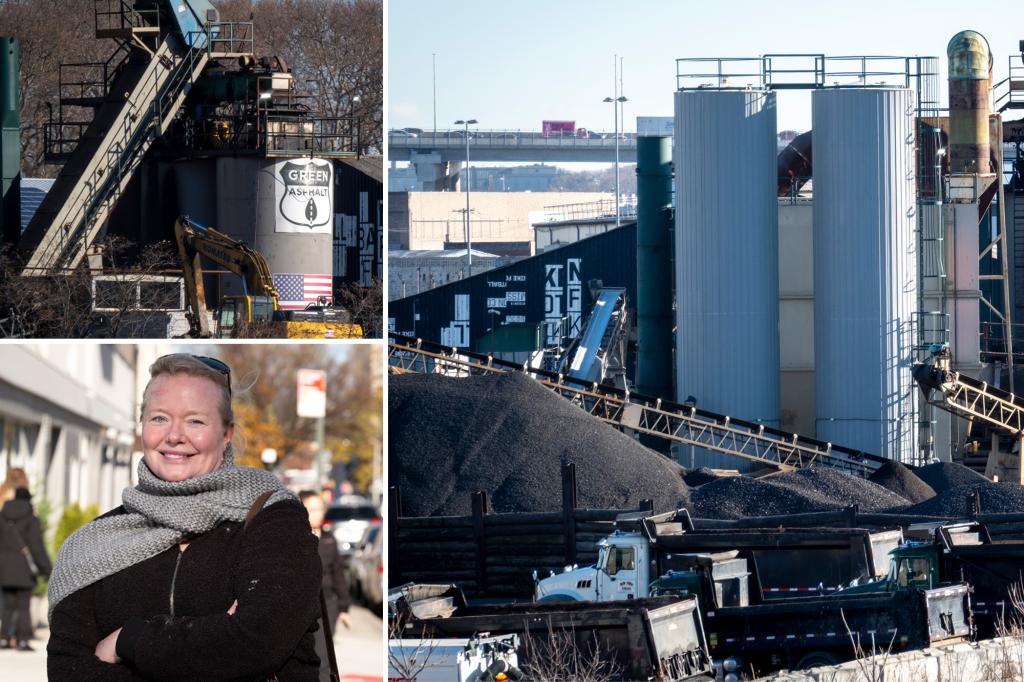Summarize this content to 2000 words in 6 paragraphs
Greenpoint residents were told they’ll soon be able to unplug their noses, but some critics say the promises have them smelling “bull.”
A chemical, burning smell that has plagued the trendy neighborhood for more than a year will be cleared in the coming months, local politicians announced this week — although residents doubt the odor is going anywhere.
Green Asphalt in Long Island City is working to adjust its flumes so that the so-called “Greenpoint Stink” will no longer waft over residential areas, according to Assembly member Emily Gallagher.
The Long Island City plant — the first 100% recycled asphalt plant in the country — estimates its hipster neighbors will be free from the stench by mid-2025.
“I’ll believe it when I see it,” one resident, who opted to remain anonymous, told The Post.
The four-year Greenpointer likened the asphalt aroma to that of “burning tires” “straight chemical waste,” a putrid mixture he and his girlfriend dubbed the “Greenpoint Stink.”
The couple almost never opens the windows in their Kingsland Avenue apartment — directly across Newtown Creek from the smelly plant — for fear the tainted air will slip in. They have also invested in an air purifier that is almost always running, he said.
“Our air quality is not that great. We know what it is and I, from having worked in that area, would see some mornings that there’s s–t going up in the sky,” he said of the asphalt plant.
The stench first assaulted the area at the tail end of last summer, quickly adding yet another stench to the already infamously smelly neighborhood — Greenpoint routinely battles tainted air from the waste treatment plant, a plastic manufacturing site and the toxic Newtown Creek.
More than 200 residents complained of the burning smell to Gallagher, whose survey led the state Department of Environmental Conservation to finger Green Ahpalt as the smelly culprit.
The problem is not just the stench — asphalt fumes can cause serious injury and permanent damage including skin cancer, according to the Occupational Safety and Health Administration.
Health effects from exposure to asphalt fumes include headache, skin rash, sensitization, fatigue, reduced appetite, throat and eye irritation, cough, and skin cancer.
“We began to get complaints about the smell last year,” Gallagher told The Post in a statement.
“We tracked and mapped them, and we shared the data with state and local agencies who helped to identify the source,” Gallagher added. “It has not gotten worse, and it occurs intermittently,”
According to the Assembly member, Green Asphalt plans to mitigate the stench through a new air dispersion model that would adjust the airstacks so that fumes would waft away from residential areas.
But where the ‘Stink’ would be diverted is still unknown.
A representative for the company could not explain the specifics of the plan or how it would avoid affecting another community in the densely populated section of the city — but assured that the problem would be fixed within the first half of 2025.
“Green Asphalt is currently working with New York State Department of Environmental Conservation to determine the most effective course of action to address the community’s concerns,” Green Asphalt told The Post in a statement.
“Green Asphalt’s goal is to remain in good standing with the community as we have over the last 13 years, and we continue to engage with local stakeholders in Greenpoint and Long Island City to resolve this as soon as possible.”
Robin Rogers, a sociology researcher and professor at Queens College, suspected the plan was nothing more than something to placate Greenpoint residents.
“That’s the biggest bulls–t,” Rogers, who has lived in Greenpoint for 25 years, said about the plan to divert the smell.
Rogers — who described the smell as “acidic” and similar to burning metal — said the neighborhood is often offered loose plans to fix ongoing problems, but is left without concrete solutions. She pointed to a town hall several years ago over the water testing at Newtown Creek, but when organizers were pressed for spefifics they clammed up.
“I wouldn’t call it new,” she said of the asphalt scent. “You get used to it.”
Carrie, who has lived in Greenpoint for 16 years, also shared skepticism the issue would be solved, especially on such a short timeline.
“I have much faith in anything they do around here. I mean, look what they did to McGuinness,” Carrie said, references a recent controversy over a bike-lane plan. “No one is doing anything for this neighborhood. It’s cool they say they’re going to, but I doubt it.”
The stench is usually at its worst in the mornings, Carrie noted, claiming it has forced her to completely alter the path she walks her pup on their daily walks.
The pair almost completely avoid McGolrick Park or the east side of the neighborhood, which seemingly get the worst of the smells.
“I feel bad walking her,” Carrie said of her dog. “I only smell it when I’m walking her and I feel bad that she smells it so much more intensely.
“[Greenpoint] really wasn’t meant to be a place for residential. It used to be all industrial, and it’s changed over the years, obviously, but no one is doing very much about it.”














